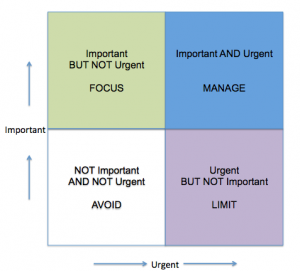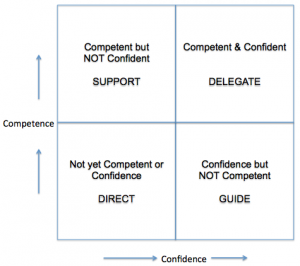Congratulations for growing your businesses rapidly so far. But how do you keep this going? Or more to the point, how do the people who work for you keep this going?
Having too much to do is a permanent feature of life in a fast growing company. What your teams do now (today!) and next (tomorrow!) is the difference between success and mediocrity. How effective are those that report directly to you at prioritising? And how effective are they at ensuring their teams can prioritise? Yes, they have the management talk, but when it comes down to how they allocate their time during the week, are you confident they are spending 80% of their time doing things that are important AND urgent?
Understanding the difference between ‘important’ and ‘urgent’ is easy. We all understand that some things are urgent and important, some things are urgent but not so important etc. However, executing and enforcing this principle throughout an organisation week in week out is not so easy. Open plan offices and a supportive team culture are (at times) designed to promote the ‘less important but urgent’ responsibilities over and above the merely ‘important’ ones. Put it to the test this week. Look at diaries and match them to what you think is ‘important’ and urgent .

The second matrix that challenged me recently is one that tests your management style. Mapping ‘competence’ and ‘confidence’ on a 2×2 basis reveals interesting issues regarding not only how your team operates but also how you manage your team. The underlying principle is that your management style needs to match the confidence and competence makeup of those that directly report to you. If your CFO is highly competent and confident, you can delegate freely. If your Sales Director is confident but less competent, then delegation is a recipe for disaster. Easy so far.

The problem may arise when you throw fast growth into the mix. When you’re rapidly growing, everyone in your management team will at some point be doing something for the first time and hence be less competent at it. If they’re self-aware and seek help, particularly if your management style is open to it, then all is manageable. The first alarm bell is that they remain confident, hiding their lack of competence, and you continue your delegation approach as that is how your working relationship has developed. Alarm bell two is that you change your management style to address the competence change, and they take this as a sign that you no longer trust them in their wider role.
These two simple matrices address two age-old issues for managers of high-growth businesses: how to better prioritise and delegate. Amongst the strategy papers, sales reports and financials, we would all be well served to make sure we have the two matrices somewhere on our desks at all times.











